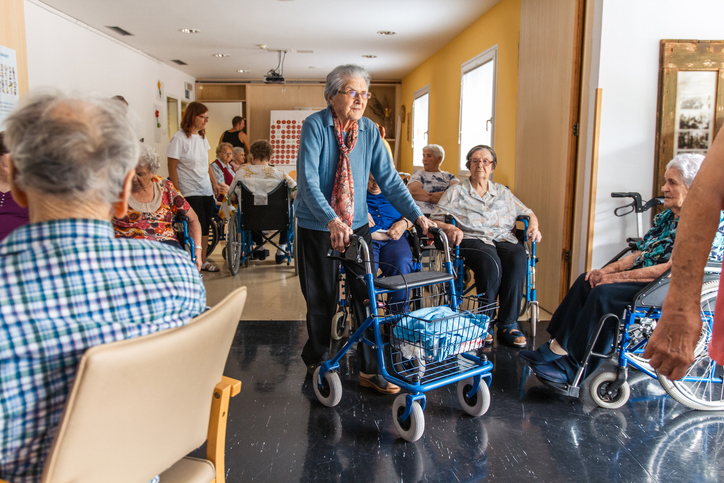Category: Social Connections
What to Do After a Loved One Dies
June 15, 2025

The loss of a loved one is one of life’s most stressful events. Almost ninety percent of people over the age of 16 have experienced grief, but 57% of Americans have experienced a significant loss within the last three years.
Mourning is the natural process someone will go through when a loved one passes away. Though many initially gather with friends and family to share the loss, the mourning process is personal and may last months or years.
Here are some gentle steps to take when processing the loss of a loved one.
Know the Symptoms of Grief
Dealing with death is something most people would rather avoid altogether, but grieving isn’t something to put off. Your grief is likely to be felt physically, emotionally, and psychologically. Allowing yourself to move through your feelings is integral to the process.
Give Yourself Time
Now is the time to take care of yourself. You don’t need to put an expiration date on your grieving. “Some people grieve for years, and while they become more functional as time goes on, they may still get hit out of nowhere with grief-related feelings,” says Dr. Judy Ho, host of the podcast Supercharged Life.
“Grief isn’t linear; it’s more circular. You may feel like you’ve accepted the loss, then something happens months later, and you circle back to denial,” says Ho. However long it takes you to begin feeling better is unique to your situation. So be gentle with yourself as you experience waves of mourning.
Routine is Everything
It is essential to develop and stick to a new routine. Many activities will feel different, and it’s okay to make changes accordingly and try new things. However, sticking to some of what’s normal for you can also be a great comfort. “Grief has a way of rocking our sense of safety, but routine creates stability, which often codes as safety,” says Dr. Anita Robinson, author of The Gift of Grief.
Lean on Your Support System
When a loved one dies, it affects everyone in their circle. “Don’t manage grief alone,” says Melissa Robinson-Brown, a clinical psychologist in New York. “If there were ever a time to lean on family and friends, this would be it.” Talk to those you feel most comfortable with and let them know what you’re experiencing.
While everyone finds their way to cope, it can be valuable to share the loss of someone and grieve together. People should be open and honest with one another and not try to hide their feelings. Because the roles of family members may change, it’s best to communicate with one another moving forward.
Bereavement Groups and Counseling
It may be helpful to join a bereavement support group. Bereavement means the state of having been deprived of something or someone valued, primarily through death. Being around others experiencing the same loss level helps many feel less alone. Hospices, hospitals, and community organizations will all have more information on support groups in your area.
One-on-one counseling can be an essential part of losing a loved one and processing that loss in a healthy way. Death can come as a great shock, and mental health counselors can offer a safe place for you to resolve those emotions. Through hospice, bereavement care is even provided for up to 13 months.
Experiencing the loss of a loved one can be a painful process. Focusing on the joy the relationship brought to your life is a great source of solace during the most emotional moments. With Insureyouknow.org, you may store your loved one’s records for safekeeping so that when it’s time to handle the logistics of someone passing, you’ll be up for the task.
Choosing the Right Care Center for Loved Ones
May 15, 2025

Moving a loved one into a care facility is an important decision that requires careful consideration. Choosing the right one takes in-depth research to determine if it’s a good fit for the individual’s needs. There are nearly 31,000 assisted living centers in the U.S. The first step in finding care is understanding the difference between types of facilities and whether they can provide the level of attention the patient needs.
Types of Care Centers
A nursing home provides around-the-clock medical care for individuals who will likely remain there until their passing. These are meant for individuals who can no longer care for themselves independently or be cared for by their loved ones at home. A skilled nursing facility may be intended for a short or long period. Still, it provides a higher level of medical attention and is usually for those recovering from surgery or an illness.
Independent living and assisted living centers are for those who need less intensive medical assistance but still require some level of care. A continuing-care center can serve as an intermediary between assisted living and a nursing home. For individuals who need 24/7 care and supervision due to Alzheimer’s or dementia, there are memory care centers that specialize in those specific needs.
Paying for Long-Term Care
Many people are unaware that there is no federal assistance available for long-term care costs. There is one exception in which Medicare will pay for the first 100 days in a nursing home or skilled nursing facility if the patient has been hospitalized for at least three consecutive days within the last year before needing to be transferred to a care facility.
Paying for care can be a significant issue for families as it can become costly. “Nursing homes are one of the most expensive levels of care,” says Amie Clark, a senior care expert. “And most people don’t have that kind of money.”
Long-term care insurance policies may be a wise, proactive investment, but they can also be expensive. In most cases, people pay privately or out of pocket until their resources are used up. According to the NCHS, 62% of nursing home residents use Medicaid as their payment source.
Other Factors to Consider
Unfortunately, nursing homes face their fair share of challenges, such as being understaffed or dealing with infectious outbreaks. This is why it’s so important for families to do their due diligence in researching facilities and not feel rushed into making a decision.
Medicare offers an online resource to find and compare nursing homes, hospitals, and other care facilities in your area. It uses a five-star rating system and provides information about each nursing home, including vaccination rates and inspection reports. Another helpful resource is the Nursing Home Inspect, which compiles nursing home inspection reports.
Experts suggest not relying on ratings alone and focusing on a facility’s staffing, saying that nothing beats an in-person visit.
Here’s what to do when you’re on-site:
- Speak with a range of employees, from administrators to activity managers to culinary directors.
- Take note of response times.“How long does it take for call lights to be responded to?” says Shannon Gimbel, manager of the ombudsman program for Denver’s Area Agency on Aging. “Are residents standing in hallways waiting for medication?”
- Notice the patients’ level of hygiene. “Listen in the hallways,” says Tony Chicotel, attorney for the patient advocacy group California Advocates for Nursing Home Reform. “Look at the hair, clothing, teeth, and fingernails of the residents.”
- Try the food. Sit in the dining hall with other residents and observe the interactions between patients and staff.
- Ask about the activities offered to residents and consider whether or not they will be intellectually stimulating.
While it’s best to find a care facility that’s close to you, traveling farther for the best fit may become necessary.
Once you determine what kind of facility your loved one needs and make payment plans, then you should do your research and take the time to visit all of the centers you’ve narrowed down on your list. With Insureyouknow.org, you may compile your research, keep track of finances, and store your loved one’s medical records in one easy-to-review place. While it will take some research, finding the right place will provide you with invaluable peace of mind.
The Pros and Cons of Living with Children in Retirement
August 1, 2023

Combining households can be a positive experience for everyone. In order to ensure that every member of the family is comfortable with living together, it will be important to talk it out. Communicating about any concerns before moving in together and then regularly thereafter will ensure that everyone remains happy with the decision to cohabitate. Amy Goyer, an AARP family expert, tells children of retirees to embrace the chance. “Look at this as an opportunity,” she adds. “You have a chance to enjoy your mom or dad in their later years. This is a way for children to know their grandparents in a way they wouldn’t otherwise.”
Before combining households, retirees and their children should consider all of the pros and cons of living together during retirement beforehand.
The Pros of Living With Children During Retirement:
- Retirees can be a big part of their grandkids’ lives. Many parents choose to live with their children during retirement so that they can be a major part of their grandkids’ lives. Some parents want to help their children raise their kids, such as picking them up from school, helping with meals, or taking their grandkids to their extracurriculars after school. Parents who were busy with work while their own children were growing up may feel that they can now make up for lost time.
- Your family will have a strong support system in place. While you may want to help your children with their needs, they may also need to help you. This can range from needing a ride to a doctor’s appointment to needing care after surgery or during an illness. Either way, living together will enable each of you to be more available to one another in times of need.
- Combined expenses may make living together more cost effective for both of you. Having a real financial talk with your children before you decide to combine households may prove that it could save each of you a lot of money. Coming up with a budget of shared expenses can actually help family members thrive both as a whole and individually. With the right budget, retirees shouldn’t have to dig into their retirement as much every month, while their children will be able to save up more of their monthly income.
In addition to communicating with one another about finances and caretaking roles, make sure everyone is allotted their own personal time. For instance, grandparents may opt to have their friends over while their grandkids are in school and their children are at work. Working together to ensure that every member of the family gets space from one another from time to time will help prevent anyone from feeling stifled. Retirement expert Nancy K. Schlossberg, author of Too Young to Be Old: Love, Learn, Work and Play as You Age, says, “If you do your emotional work upfront, you’re more likely to be satisfied with your final decision.”
The Pros of Living With Children During Retirement Could Also be the Cons:
- Retirees may not want to become full-time babysitters. If your children have children, and you’re disinterested in being a full-time babysitter to the grandkids, setting boundaries upfront about what you do and don’t want to do will be extremely important. Also, consider day-to-day life with young children and maybe pets. “If you have no tolerance for noise, do you want to move into a house with children or teenagers?” asks Jennifer Prell, president of Illinois elder-resource network Silver Connections.Be realistic about what you will and won’t be able to handle on a daily basis.
- Children of retirees may not want to become full-time caretakers either. Children of retirees may not be prepared for the burden of caring for their own parents.Again, establishing what everyone is comfortable with will be imperative. Contemplate the worst-case scenarios before moving in together. “Even if Mom moves in relatively healthy, that could change overnight,” elder-law attorney Kerry Peck points out. “Families generally underestimate the amount of care that Mom is going to require.”
- Retirees (or their children) may end up footing the bill for everyone. If retirees or their children become overly reliant on one another, then moving in together may become more expensive for one party than remaining apart. Having an honest talk about financial responsibilities and emergency savings before moving in together should help prevent unexpected expenses for either one of you down the road. “So many families run into trouble when something bad unexpectedly happens,” says Jill Schlesinger, author of The Dumb Things Smart People Do With Their Money. “That’s why it’s so important to talk to your kids about the What-Ifs,” said Schlesinger.
Consider Alternatives to Living Together
If you decide that joining households may not be the best option for your family, there are alternatives. Simply living closer to one another can reap the same benefits of living with children during retirement while removing the downsides.
While there’s an appeal to living ten minutes from one another, one of you may feel as if some of your independence has been lost. Talk to your children, and decide how close is too close. If in the end, you decide to live farther away from your children, planning reciprocal visits or spending part of the year with them may turn out to be the best of both worlds.
If you do decide to remain independent during retirement, make sure there’s plenty of room in your home for your children to visit or stay overnight. If you have more than one child, factor in enough space for all of them and their families, so that each of your children may visit you simultaneously.
In the end, living with your children during retirement should be beneficial for both of you. Insureyouknow.org can help your family keep the peace. When combining households, keeping the budget, financial information, healthcare records, and even family schedules in one easy-to-access place can help everyone work together to keep the household running smoothly. Since communication will be the key to living happily together, it will be important for everyone to be in the know.
Take These Five Simple Steps to be Healthy at Any Age
July 14, 2023

Cognition, our ability to think clearly, often declines as we get older. While some may develop Alzheimer’s or dementia, many will experience changes in learning, memory and thinking. Research proves that taking small steps toward living a healthier life helps to minimize declines in cognition, such as maintaining physical activity. Incorporating regular exercise is just one of the following five simple steps to be healthy at any age.
1. Exercise regularly.
“Exercise is also one of the best things you can do to help prevent dementia and other cognitive changes,” says Argye Hillis, M.D. at John Hopkins Medicine. “Once you’re cleared by your doctor, aim for at least 30 minutes of physical activity most days of the week.” Combining eleven studies, the Alzheimer’s Society found that regular exercise reduced the risk of developing dementia by 30 percent, and the risk of Alzheimer’s specifically was reduced by as much as 45 percent.
If exercise is something you loathe, it doesn’t take a lot of strenuous activity to improve one’s overall health dramatically. Walking for a total of 30 minutes a day helps keep the brain healthy by delivering more blood and oxygen to cells. In addition to preventing Alzheimer’s, walking can boost mood, keep bones and muscles strong, and reduce the risk of other diseases, such as heart disease and diabetes.
When someone is ready to get serious about preventing age-related problems, resistance training is going to be the best place to start. “The average woman can lose 23 percent of her muscle mass between the ages of 30 and 70,” says Fabio Comana, an exercise physiologist at the National Academy of Sports Medicine. “Resistance workouts in particular – can increase mass and strength well into your 90s.”
Resistance training is simply exercising your muscles using an opposing force, and the best part is that anyone can practice resistance training using no more than their body weight. Squats, push ups, and planks are all examples of resistance training that can be practiced anywhere.
2. Improve your diet.
It is undeniable that the food someone eats plays a major role in how they feel. “Ninety percent of the diseases known to man are caused by cheap foodstuffs,” said Victor Lindlahr, an American nutritionist in the 1930s. “You are what you eat.” If someone wants to feel good, then there’s no way around eating better.
In 2022, the U.S. News & World Report named the Mediterranean diet the Best Overall Diet for the fifth year in a row. According to research by Harvard Medical School, the Mediterranean diet may help prevent heart attacks, strokes, and premature death. “The latest research shows that a low-glycemic diet high in fresh fruits and vegetables, whole grains, and lean protein is healthiest,” Jeffrey Benabio, M.D. at Kaiser Permanente Primary Care, tells patients.
3. Make quality sleep a priority.
Did you know that not getting enough sleep can put an individual at higher risk for developing diabetes, cardiovascular disease, depression, and even obesity? Recent research even shows a link between insomnia and accelerated aging of the brain. “Too many of us treat sleep as a luxury instead of a need,” says Dr. Benabio of Kaiser. “If I could encourage people to make one healthy change, it would be to sleep more.”
The National Sleep Foundation recommends adults get 7 to 9 hours of quality sleep every night. They also point out that most sleep problems are a result of underlying medical conditions, such as acid reflux, which is why addressing any sleeping problems with one’s doctor is a good place to start.
4. Schedule regular checkups with your doctor.
Regular checkups with the doctor, dentist, and other specialists are invaluable opportunities for people to catch problems early and treat them before they become bigger problems. A 2021 study by the National Library of Medicine found that individuals who went to the doctor regularly reported improved quality of life and feelings of wellness. Plus, visiting the dentist and preventing inflammation in the mouth can help manage other inflammatory conditions like diabetes and heart disease, according to the American Academy of Periodontology. Keeping up on these yearly appointments and follow ups is a simple thing that can reap life-saving benefits.
5. Take Time to Connect
The World Health Organization estimates that more than 300 million people worldwide suffer from depression, with many more affected by anxiety disorders. Someone who feels lonely is more likely to get dementia or depression. This is because such individuals have higher levels of stress hormones which cause inflammation in the body and a lowered immune response. Strong friendships alleviate stress, improve emotional well-being, and are markers of physical health. Experts suggest people can grow their social connection by creating a community through their work relationships, by volunteering, and by making friendships a priority. “Strong bonds won’t happen overnight, but starting small and prioritizing friendships as an important part of your life can bring more happiness, less stress and more support,” says Adam Smiley Poswolsky, author of Friendship in the Age of Loneliness. “You know someone is a true friend when they have your back when you’re sick, when you lose your job, when you make a mistake, when you’re going through a break-up, when you’re stressed, when you’re sad.”
Stress is inevitable, and it is proven to negatively affect one’s health. By following these five simple steps, anyone can decrease their levels of stress and increase their overall wellness. Physical activity, eating a balanced diet, good sleep, and social support can all combat the effects of stress on the body. You may be thinking that while you’re already stretched thin, fitting in these healthy practices may cause you more stress. That’s why starting small with manageable changes will help you incorporate these steps into your routine. Insureyouknow.org can help you manage regular checkups and social engagements and even keep track of medical records, diet journals, sleep data, and exercise logs. Keeping all of your information in one place makes it easy to recognize the positive impact these simple steps will have on your overall health.
